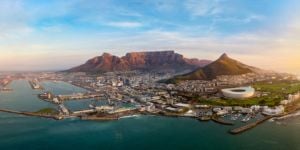
Diversity is one of the words that could best describe South Africa: diversity of landscapes, languages and people. Here's what you need to know about the kind of lifestyle you should expect when moving to South Africa.
Key features of South Africa
Diversity of landscapes: due to its large surface area, 1.2 million km², the landscapes of South Africa are very varied. There are stretches of desert, savannah, forests, mountains and beaches.
Diversity of languages: eleven languages are recognized as official. Most South Africans speak more than one language. English is used as the main language, followed by Zulu, Xhosa and Afrikaans.
Population diversity: South Africa has a population of approximately sixty million people, of which 80% are of African descent, 10% are of European descent, 7.5% are of mixed race and 2.5% are Asian.
The South African population
The black population is diverse as it is composed of people from several tribes. The main ethnic groups are the Zulu, Basotho, Venda, Xhosa, Tsonga, Khoikhoi, Ndebele and San. Each tribe has its own beliefs, language and cultural practices related to marriage, childbirth and child-rearing. Polygamy is officially permitted. South Africa's tribal structure does not fit easily into a democratic system, and the South African Constitution has recognized this fact by creating six Provincial Houses of Traditional Leaders, which are located in the Eastern Cape, Free State, KwaZulu-Natal, Mpumalanga Limpopo and the North West. The younger generation moves to urban areas in search of a better life and tends to abandon its traditions and culture.
The population of European origin is composed of Afrikaners (60%), descendants of Dutch settlers, French Huguenots, German Protestants and English speakers, descendants of British settlers.
In addition, South Africa also hosts refugees, especially from Zimbabwe, the Republic of Congo, Somalia and Nigeria. Most of these are illegal immigrants, estimated to number between four and eight million, who settle mainly in the townships of the major cities.
South Africa's culture is diverse and is expressed through its languages, cuisine, music and dance. South Africans remain deeply attached to their roots and history.
The diversity of lifestyle depends on income and geographical location.
During Apartheid, cities were divided into white cities and townships. After apartheid, the white population deserted the city centers and moved to the inner suburbs. Secure residential complexes for the middle and upper classes, regardless of race, were developed.
Townships in South Africa
African cities are very different, with clearly identified and delimited neighborhoods, some for the very rich, others for the middle class, and others for the poor who live in townships near industrial areas. There are also shanty towns on the outskirts of the big cities, with informal urbanization, without water, electricity or roads. The suburbs where the middle and upper classes live are the safest, with crime more like burglary, but murders take place in the townships and slums.
About 20 million South Africans live in townships. Living conditions there have improved since the end of apartheid, and they have been upgraded. Standardized houses have been built, schools and medical facilities have been opened, and a local economy has emerged with small businesses, craftsmen and artists.
South Africa, despite its dynamism, is one of the most unequal countries in the world, and this is felt in access to natural resources (water, energy), education and health care, with 40% of the population living below the poverty line.
Staying fit in South Africa
The South African middle-class or well-to-do, living in urban areas, leads a daily life similar to that of Europeans, especially Northern Europeans. They get up early in the morning, play sports indoors or outdoors. Staying fit and having a healthy lifestyle is one of the priorities of South Africans. They are strongly encouraged to do so by most health insurance companies that offer discounts to their insured members of a gym. Most gyms open at 5 am.
After sport, he usually goes to a pub for an English breakfast. The English Breakfast, with eggs, bacon, toast, beans and tomatoes, is one of the Anglo-Saxon heritage that South Africans have kept. Most pubs serve it, there is even strong competition between them for prices, and it is a friendly way to start the day or to have your first date.
The working day usually starts at 8 am and ends at 5 pm. Lunch is usually light and taken at the workplace because the lunch break is short.
The evening meal is usually served around 6 p.m., and bedtime is around 8 p.m.
This rhythm of life is all the more important since school classes begin at 8:00 a.m., but students must be present at the daily assembly, which takes place 15 minutes before classes begin, and to this must be added the travel time.
Therefore, outside of the tourist season, the restaurants stop serving around 8:00 p.m.
The friendly atmosphere in South Africa
South Africans are friendly and convivial. They approach people they don't know very easily and make conversation easily. On the other hand, the kiss as a greeting is not practiced; it is the hug. The word "Howzit" following a hello means "How are you?"
South Africans love to go out and entertain. The family and friendship circle is very important to them.
South African cuisine
South African cuisine is a mixed cuisine that has been inspired by that of the indigenous peoples, settlers, slaves and immigrants, but more generally, meat occupies a prominent position. Among the specialties is the biltong, which is beef, ostrich or antelope meat that is flavored and dried and eaten in thin slices as an aperitif. Potjiekos is a traditional Afrikaner stew made of meat, vegetables and spices cooked over a wood fire in a cast iron pot. Often considered the national dish of South Africa, Bobotie originated in the Cape Malay colony and consists of a mixture of curried minced meat and fruit covered with a creamy milk and egg base that is served with rice. The origin of the Bunny chow dates back to the arrival of Indian migrants in Durban and consists of a whole loaf of bread that is cut at one end and then filled with curry. This method allowed Indians working in the sugar cane fields to easily transport their food and keep it hot. Bunny Chow is one of the most common street food dishes in South Africa.
National celebrations in South Africa
Heritage Day, a public holiday, is celebrated on September 24. But with so many different cultures, it was difficult to find a common heritage for the whole population. In 2005, Heritage Day became Braai Day, the equivalent of our barbecue, which brings the whole population together around the South African culinary tradition. The Braai is an institution and a must for any gathering of family and friends, regardless of race or class. Boerewors (which means farmer's sausage), sausages made from pork, beef and spices, are a staple of a successful braai, but marinated lamb and chicken and game meats such as antelope are also grilled. And traditionally, the meats are accompanied by potato salad and pap (a kind of corn-based polenta) with its spicy tomato sauce.
Shopping in South Africa
South Africans are also fond of markets, which are held in the morning on weekends. These can be farmers' markets, where farmers sell their produce, or markets organized by charities, where they meet family and friends to share breakfast.
South Africans also frequently visit shopping malls, which are at the same time places of shopping, culture with cinemas and exhibitions and places of entertainment, relaxation and sports with climbing walls and even, as in the Gateway mall in Durban, a wave pool for surfing. There are about 2000 shopping centers in South Africa, and some of them are among the most beautiful and largest in the world.
Events in South Africa
A large number of sporting, cultural and gastronomic events take place throughout the year in South Africa. The Cape Town Minstrel Carnival, in January, is a street parade dating back to the 19th century, when Cape Town enslaved people had their annual day off. It is a music and dance festival with minstrel troupes. The International Mozart Festival and the Cape Town International Festival are world-famous. The Klein Karoo Nasionale Kunstefees, an Afrikaans language arts festival, is the largest festival in South Africa in terms of the number of visitors. The Splashy Fen Music Festival is the oldest in South Africa and takes place over several days during the Easter weekend in the Drakensberg. International sporting events such as the International Iron Man World Championship, the Two Oceans Marathon, the Comrades Marathon and the Cape Town Cycle Tour are well attended by South Africans. The South African Cheese Festival in Stellenbosch and the Wacky Wine Weekend in Robertson are also very popular.
If racial segregation is still anchored in the generation that lived under the Apartheid regime, the younger generation is much more tolerant and more open-minded towards other cultures and ways of life. But racial segregation has been succeeded by social and economic segregation as the lifestyle now depends on financial and geographic location.
We do our best to provide accurate and up to date information. However, if you have noticed any inaccuracies in this article, please let us know in the comments section below.








